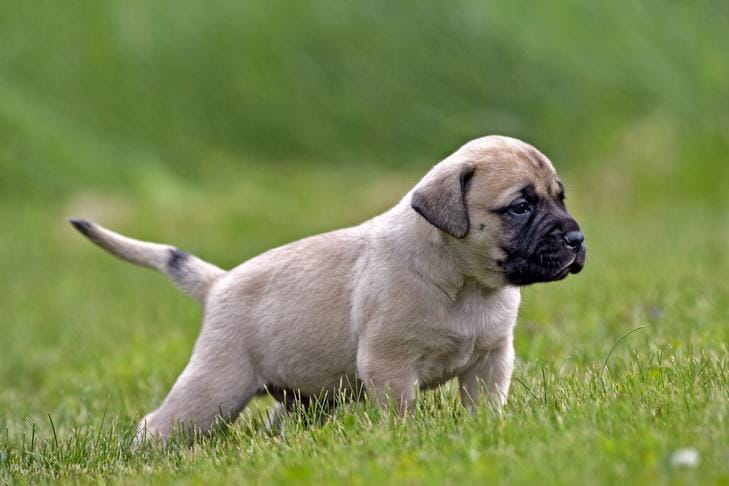Mastiffs are a popular breed of dog known for their imposing size and gentle temperament. For those considering adding a Mastiff puppy to their family, the question of how much they cost is likely at the forefront of their minds. While the price of a Mastiff puppy can vary depending on several factors, including breeder reputation and location, there are some general guidelines to keep in mind.

On average, Mastiff puppies can cost anywhere from $1,500 to $4,000.
However, it's important to note that some breeders may charge significantly more for puppies with desirable traits, such as a particular coat color or lineage. Additionally, purchasing a puppy from a reputable breeder who performs health screenings and genetic testing may also increase the cost. Despite the potential cost, many Mastiff owners find that the joy and companionship provided by their furry friend is well worth the investment.
Understanding Mastiff Breeds
Breed History
Mastiffs are a group of large, powerful dogs that have been around for thousands of years. The English Mastiff, which is one of the most well-known breeds, is believed to have originated in Britain over 2,000 years ago. These dogs were used as guard dogs and were even used in battles.

The breed was nearly extinct by the 1800s, but a group of dedicated breeders worked to revive the breed. Today, the English Mastiff is recognized as a breed by the American Kennel Club and is a popular choice for families looking for a loyal and protective pet.
Breed Characteristics
Mastiffs are known for their large size and impressive strength. They are typically very loyal and protective of their families, but can also be stubborn and difficult to train. They require a lot of exercise and socialization to prevent behavioral issues.
Mastiff Varieties
There are several different varieties of Mastiff breeds, each with their unique characteristics. Some of the most popular varieties include the English Mastiff, the Bullmastiff, and the Neapolitan Mastiff.
The English Mastiff is the largest of the Mastiff breeds and is known for its gentle nature. The Bullmastiff is a cross between the English Mastiff and the Bulldog and is known for its strength and loyalty. The Neapolitan Mastiff is a large, ancient breed that was originally used as a guard dog.
Overall, Mastiffs are a unique and impressive breed that requires a lot of care and attention. While they can be difficult to train, they make excellent pets for families who are willing to put in the effort to properly socialize and exercise them.
Considering the Costs
Owning a Mastiff can be a rewarding experience, but it is crucial to consider the costs associated with owning one before making a purchase. In this section, we will discuss the initial purchase price, long-term ownership costs, and unexpected expenses that may arise.
Initial Purchase Price
The initial purchase price of a Mastiff puppy can vary depending on the breeder and location, but on average, they can cost anywhere from $1,500 to $4,000. It is required to do research on the breeder and ensure that they are reputable and provide healthy puppies.
Long-Term Ownership Costs
In addition to the initial purchase price, there are long-term ownership costs to consider. These costs include food, insurance, medical costs, and additional supplies such as a dog bed, leash, dog crate, and collars.
Food
Mastiffs are large dogs and require a significant amount of food. On average, a Mastiff will consume around 10-12 cups of food per day, which can cost anywhere from $50 to $100 per month.
Insurance
Pet insurance is a vital consideration for any pet owner, and Mastiffs are no exception. Depending on the coverage selected, pet insurance can cost anywhere from $30 to $100 per month.
Medical Costs
Mastiffs are prone to certain health issues such as hip dysplasia and bloat, which can result in expensive medical bills. Routine vaccinations and vet visits can also add up over time. On average, medical costs for a Mastiff can range from $500 to $1,000 per year.
Additional Costs
Additional supplies such as a dog bed, leash, dog crate, and collars can cost anywhere from $100 to $500 depending on the quality of the products.
Unexpected Expenses
Unexpected expenses can also arise when owning a Mastiff. These expenses can include emergency vet visits, unexpected medical issues, and property damage. It is critical to have a financial plan in place to cover these unexpected expenses.
Health and Wellness

When it comes to owning a Mastiff puppy, it is essential to prioritize their health and wellness. This means taking necessary steps to prevent common health issues, providing proper diet and nutrition, and staying up to date with vaccinations and screenings.
Common Health Issues
Like all breeds, Mastiffs are susceptible to certain health issues. Some of the most common issues include hip and elbow dysplasia, cancer, bloat, and wobbler syndrome. While these conditions can be serious, they can often be prevented or managed with proper care.
Preventive Care
Preventive care is key to keeping your Mastiff puppy healthy. This includes regular vet check-ups, screenings for hip and elbow dysplasia, and vaccinations to prevent common diseases. It is also important to provide plenty of exercise and mental stimulation to prevent obesity and other health issues.
Diet and Nutrition
Proper diet and nutrition are essential for the health and wellness of your Mastiff puppy. It is important to feed them a high-quality, balanced diet that is appropriate for their age and activity level. Avoid overfeeding and monitor their weight to prevent obesity, which can lead to a host of health issues including joint problems and heart disease.
Training and Socialization
Mastiffs are known to be intelligent and trainable dogs, but it is important to start training and socialization early on in their lives. This will help them become well-behaved and socialized dogs.
Basic Obedience
Basic obedience training is essential for all dogs, including Mastiffs. This includes teaching them commands such as sit, stay, come, and heel. It is crucial to be consistent with the training and to use positive reinforcement techniques. Mastiffs respond well to praise and treats, so it is important to use these rewards during training.
Social Skills
Mastiffs are known to be gentle giants, but they can be wary of strangers if they are not socialized properly. Socialization should begin early on in their lives and should involve exposure to different people, animals, and environments. This will help them develop the social skills they need to interact with others positively.
Advanced Training
Mastiffs can also benefit from advanced training, such as agility training or puppy training classes. These classes can help them develop their physical and mental abilities, as well as improve their obedience skills. It is important to choose a reputable training program that uses positive reinforcement techniques.
In addition to training, Mastiffs also require regular exercise and dog walking to maintain their physical and mental health. A well-trained and socialized Mastiff can make a wonderful companion and family pet.
Grooming and Care
Coat Maintenance
Mastiffs have a short, double coat that sheds moderately throughout the year. Regular brushing with a slicker brush or grooming mitt can help remove loose hair and prevent matting. It is important to use a gentle shampoo when bathing your Mastiff, as their skin can be sensitive. Mastiffs do not require frequent bathing, as over-bathing can strip their coat of natural oils.
Hygiene Practices
Mastiffs are known to drool, and it is important to keep the skin around their mouth clean and dry to prevent irritation and infection. Regular ear cleaning is also important to prevent ear infections. Mastiffs are prone to laziness, and it is important to encourage regular exercise to maintain their overall health.
Exercise Needs
Mastiffs are a large breed and require moderate exercise to maintain their health. Daily walks and playtime in a secure, fenced yard can help keep them active and prevent obesity. It is important to monitor their activity levels and not over-exercise them, as they can be prone to joint issues.
Finding a Reputable Breeder
When looking for a Mastiff puppy, it is crucial to find a reputable breeder. A reputable breeder will provide you with healthy puppies and ensure that they are well-socialized. Here are some things to consider when looking for a reputable Mastiff breeder.
Breeder Credentials
A reputable breeder should have credentials that demonstrate their expertise in breeding Mastiffs. Look for breeders who are members of the Mastiff Club of America or other reputable organizations. These organizations have strict breeding standards, and their members are committed to producing healthy puppies.
Questions to Ask
When speaking with Mastiff breeders, ask them questions about their breeding program. A reputable breeder should be able to answer your questions and provide you with information about their breeding practices. Ask about the bloodline of the puppies, the health of the parents, and any genetic testing that has been done.
Health Guarantees
A reputable breeder will provide you with a health guarantee for your Mastiff puppy. This guarantee should cover any genetic health problems that may arise in the future. Make sure to read the guarantee carefully and ask any questions that you may have.
Preparing for Your New Puppy

Bringing home a new Mastiff puppy is an exciting time for any family. However, it is important to prepare your home and family for the new addition. Here are some essential steps to take before bringing your Mastiff puppy home.
Essential Supplies
Before bringing your new puppy home, make sure to have all the essential supplies ready. This includes a dog bed, food and water bowls, toys, and grooming supplies. It is recommended to purchase high-quality supplies to ensure your puppy's comfort and safety. Amazon is a great resource for purchasing these supplies.
Setting Up Your Home
It is important to puppy-proof your home before your new Mastiff arrives. This means removing any hazardous items that your puppy could chew on or swallow, securing loose wires and cords, and blocking off any off-limits areas. You may also want to set up a designated area for your puppy to eat, sleep, and play.
First Days with Your Puppy
The first few days with your new Mastiff puppy are crucial for building a strong bond and establishing good habits. Make sure to spend plenty of time with your puppy, providing love and attention. It is also important to establish a routine for feeding, potty breaks, and exercise. Finally, make sure to purchase an ID tag with your contact information in case your puppy ever gets lost.
By following these steps, you can ensure a smooth transition for your family and your new Mastiff puppy.
Mastiffs and Family Life
Mastiffs are known for their gentle giant nature, making them a great addition to any family. They are intelligent, loyal, and fearless, which makes them an excellent protector for children and other pets. Here are some things to keep in mind when considering a mastiff for your family.
Compatibility with Children
Mastiffs are known for their loving and docile nature, making them great companions for children. They have a calm and patient temperament, which makes them an excellent playmate for kids. However, due to their large size, it is important to supervise interactions between children and mastiffs to prevent any accidents.
Introducing to Other Pets
Mastiffs are generally good with other pets, especially if they are introduced at a young age. They have an instinct to protect their family, which makes them a reliable companion for other animals in the household. However, it is important to supervise interactions between mastiffs and other pets to ensure everyone's safety.
Mastiffs as Protectors
Mastiffs are known for their guarding instincts, making them an excellent guard dog and watchdogs. They are loyal and fearless, which makes them an ideal protector for families. However, it is important to train mastiffs properly to ensure that they do not become overly aggressive, especially towards strangers.
Legal and Ethical Considerations
Ownership Laws
Before purchasing a Mastiff puppy, it is essential to research the ownership laws in your area. This includes licensing requirements, leash laws, and breed-specific legislation. In the United States, some states and cities have restrictions on owning certain breeds, including Mastiffs. It is crucial to ensure that you are legally allowed to own a Mastiff before bringing one home.
Breeding Regulations
When purchasing a Mastiff puppy, it is important to consider the breeder's reputation and breeding practices. Reputable breeders follow ethical breeding practices, which include health testing, genetic screening, and proper socialization of puppies. It is crucial to research the breeder thoroughly and ask for references to ensure that they are reputable. Additionally, it is important to note that breeding Mastiffs can be a complex process and should only be done by experienced breeders.
Rescue and Adoption
If you are considering bringing a Mastiff into your home, it is important to consider rescue and adoption options. There are many Mastiffs in need of loving homes, and adopting a rescue Mastiff can be a rewarding experience. Additionally, rescue organizations often have strict adoption requirements, which can include home visits, reference checks, and adoption fees. It is important to research rescue organizations thoroughly and ensure that you meet their adoption requirements.
Conclusion

In conclusion, the cost of Mastiff puppies varies based on factors like breed purity, bloodline, and breeder reputation. Understanding additional costs and making informed decisions are crucial for providing a loving and suitable home for a Mastiff.
Frequently Asked Questions (FAQs)
- What factors contribute to the price of Mastiff puppies?
- The price of Mastiff puppies is influenced by factors such as breed purity, bloodline, color, breeder location, and reputation.
- Are there additional costs beyond the initial purchase of a Mastiff puppy?
- Yes, there are ongoing costs like veterinary care, food, and training. Budgeting for these is essential for responsible ownership.
- How much does it cost to adopt a Mastiff from a rescue organization?
- Adoption costs vary but typically range from $200 to $500. This fee often includes vaccinations and spaying/neutering.
- What health issues are common in Mastiffs?
- Mastiffs may face health issues like hip dysplasia and heart conditions. Regular vet check-ups help catch and address these concerns early.
- Should I adopt or purchase a Mastiff?
- Both options have pros and cons. Adoption is rewarding but may lack background information, while purchasing offers more details but can be pricier.